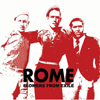 Rome's bold and prismatic vision is anchored by one of the strongest vocalists I've heard this year. Jerome Reuter's commanding and resonant voice is a significant part of this band's appeal, but it's the exotic and manifold musical styles used throughout the record that generate the most excitement and make Flowers From Exile a joy to hear.
Rome's bold and prismatic vision is anchored by one of the strongest vocalists I've heard this year. Jerome Reuter's commanding and resonant voice is a significant part of this band's appeal, but it's the exotic and manifold musical styles used throughout the record that generate the most excitement and make Flowers From Exile a joy to hear.
Jerome Reuter's deep tenor recalls the deliveries of both Dave Gahan and Nick Cave. Coincidentally, the music he writes draws from the same deep well of drama, personal confession, damnation, and redemption implemented by both of those writers. On this record Reuter has more in common with the likes of Nick Cave or someone like Bob Dylan than he does with a pop star, but his music isn't a simple reflection of any one musical genre. Flowers From Exile is supposedly based upon the events of the Spanish Civil War, a conflict in which Retuer's family partook. The various samples used throughout the album, as well as its exotic arrangements, intimate an atmosphere of conflict and resignation, but specifics never quite materialize the way they would in folk music or songs of political protest. More plainly, Flowers tackles the familiar topics of isolation, desperation, and displacement whether it be political, familial, or religious in scope. Reuter's use of broad metaphor makes personal investment easy and ultimately lends the album a melodramatic tint, but the band's restraint and honesty takes the cheap catharsis of melodrama and converts it into a spectrum of various intrigues and ambiguities. In this way, the band's claim that they are influenced by chanteurs makes sense, especially if that influence were to include the likes of Jacques Brel or Serge Gainsbourg. As is the case with nearly every album conducted by a poet-musician, there are spots of lyrical extravagance that border on cloying, but Flowers' many merits make such excesses forgivable.
Many of those merits can be attributed to Rome's other half, Patrick Damiani. Responsible for producing Flowers and writing its arrangements, Damiani populates Reuter's world with the sounds of field recordings, foreign voices, martial rhythms, atmospheric howls, and a variety of musical styles from flamenco to pseudo-industrial collage. Despite that variety, the album stays focused and never degenerates into a formless mush. Comparisons to famous "neofolk" or "apocalyptic folk" groups makes sense to some small degree however the band's versatility is enough to distinguish them from groups like Death in June or Sol Invictus, not to mention their subtlety and restraint. Rome concentrates the majority of their energy on quality songwriting, a fact crystallized in both the memorable melodies and diverse forms employed throughout Flowers. The group rarely falls back on the verse-chorus-verse formula, they never rely on atmosphere or pomp to hold their music up, and the train of samples and instruments that pepper the record gel with the songs more often than they clash.
Patrick garnishes Jerome's songs with layers and layers of instrumentation, but uses the guitar to hold his ideas together. So, while welters of noise sizzle beneath some songs and operatic voices swell up beside others, Damiani's strumming moves forward and provides both a musical and narrative momentum. And the best songs have quite a bit of momentum to them. "The Secret Sons of Europe" and "To Die Among Strangers" are heavy and propulsive numbers with explosive qualities. One is a rhythmically intricate piece with sharp corners, sampled choruses, understated solos, and a gilded horn section. The other is an emotionally heavy performance accented by a quickly strummed guitar and an elegant violin part. They put the album's slowly developed tension to good use and, as a result, are two of the more memorable songs on the record. Rome's slower, more traditional songs do not inspire equally glowing reactions, however. Both "Odessa" and the titular closer feel somewhat empty or unfinished next to their richly decorated brethern. These songs are no less strong than any of the others, but they represent the places where Damiani's production does not rise the occasion. This is a minor annoyance, but it reveals that Reuter's voice is only as compelling as the music that surrounds it. Flowers From Exile is a gem of a record nonetheless, and its lackluster ending does little to compromise its many virtues.
samples:
Read More

